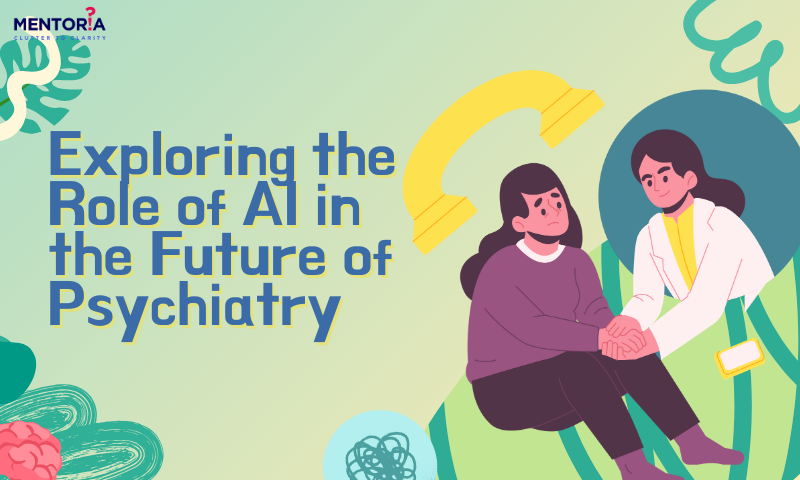Exploring the Role of AI in the Future of Psychiatry

Ever wondered how technology could change the way we think about mental health? With the rise of artificial intelligence (AI), the field of psychiatry is experiencing some major shifts. Imagine apps that can help diagnose mental health conditions just by chatting with you, or algorithms that tailor therapy plans to fit your unique vibe.
Recently, we hosted a webinar featuring Dr. Sujay Prabhugaonkar, a consultant psychiatrist. During this engaging session, we dived into the profound impact AI is having on psychiatric practice, chatting about the path, challenges, stigma, and what’s next for the field. Dr. Sujay shared insights on the transformative impact of AI in psychiatry. Also discussing its applications in early diagnosis, personalised treatment, and the evolving ethical considerations that come with these new technologies.
Want to learn more? Watch Mentoria’s webinar where leading experts discuss the future of psychiatry and how technology will shape it.
Expert Opinions: The AI Game-Changer
Experts in psychiatry are buzzing about AI as a revolutionary tool that could totally change how we diagnose and treat mental health conditions. Dr. Sujay, along with other researchers, highlighted how AI can sift through massive amounts of data—like patient histories and behaviour patterns—to help make diagnoses more accurate and timely. For instance, AI can catch subtle signs of depression or anxiety that might slip past human eyes. This means psychiatrists can make smarter treatment decisions earlier on.
Plus, there’s a lot of excitement around AI-powered virtual assistants and chatbots. While they can’t fully replace the human touch that a therapist offers, they’re like that helpful friend who’s always there with exercises, coping strategies, and general mental health advice when you need it. According to a study published in Frontiers in Psychiatry, these AI-driven solutions could help close the gap in mental health care, especially in communities where services are lacking. But experts agree that we need ongoing research to make sure these tools are safe and effective.
Upcoming Trends: What’s Next?
One of the coolest developments is the use of predictive analytics for early diagnosis. AI models are now capable of spotting early signs of mental health issues before they become obvious. With natural language processing (NLP) tech, AI can analyse how we talk and write, giving insights into our mood and potential cognitive problems. This means that psychiatrists can step in sooner, which can make a huge difference in recovery.
Another trend is personalised treatment plans through AI. Thanks to wearable devices, AI can keep tabs on stuff like heart rate, sleep patterns, and stress levels. This continuous flow of info helps doctors tweak treatments in real time, making them fit each patient’s unique needs. Plus, AI is being integrated into telepsychiatry, which is a game-changer for remote care. These trends highlight a shift towards a more patient-centred approach in psychiatry, focusing on personalised, data-driven care solutions.
The Future: A New Era in Mental Health Care
Research highlights how artificial intelligence (AI) is changing the game in spotting mental health issues like depression and anxiety. The review points out that AI can sift through tons of data from sources like health records and even social media posts to find early signs of these conditions. This means doctors can make quicker and more accurate diagnoses, which is super important for getting people the help they need sooner. However, experts warn us to think carefully about the ethical side of things, especially when it comes to keeping patient data safe and making sure these AI tools are properly tested.
Challenges and Concerns
Looking ahead, AI is set to take on even bigger roles in psychiatry. It’s not just about tackling diagnosis and treatment challenges, but also about addressing larger issues like accessibility and mental health inequalities. Experts believe AI will help scale mental health care so that clinicians can manage more patients while still providing quality support. We might even see new therapeutic approaches, like virtual reality (VR) therapies that adapt to our specific needs thanks to AI insights.
There are ongoing ethical concerns around data privacy and patient consent. As Dr. Sujay pointed out, “AI tools collect and analyse highly sensitive personal data, so we need to have strong privacy protections in place.” It’s essential that ethical guidelines keep pace with these technologies to ensure they’re used responsibly. If we can tackle these hurdles, AI could truly revolutionise psychiatric practice, making mental health care more inclusive and effective. We’re on the verge of a new era in mental health treatment, and it’s looking bright!
Conclusion: Embracing AI for a Brighter Future in Psychiatry
The integration of artificial intelligence in psychiatry is paving the way for more effective mental health care. As Dr. Sujay Prabhugaonkar emphasised during the webinar, “AI has the potential to revolutionise the way we diagnose and treat mental health conditions, making support more accessible and tailored to individual needs.” However, while the future looks promising, it’s essential to address ethical concerns regarding data privacy and ensure that these AI tools are developed responsibly. By balancing innovation with care, we can create a mental health landscape that not only leverages technology but also prioritises patient safety and wellbeing. As we move forward, it’s clear that AI could play a crucial role in transforming mental health care for the better, providing hope and healing to many who need it.






